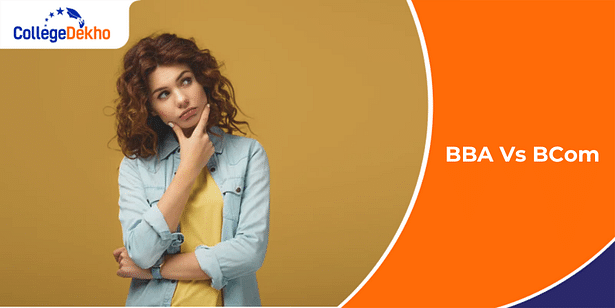BBA and BCom are the most popular courses after class 12. Both are ideal for students from a commerce background, but their syllabi focus on different aspects of business. If you seek a career in management, BBA is the right choice but BCom is preferred if you are interested in commerce.
- BBA vs BCom: Highlights
- BBA vs BCom: About the Course
- BBA vs BCom: Eligibility Criteria
- BBA vs BCom: Admission Process
- BBA vs BCom: Syllabus
- BBA vs BCom: Specialisations Offered
- B.Com vs BBA: Higher Studies
- BBA vs BCom: Career Prospects
- BBA vs BCom: Salary
- BBA vs BCom: Colleges in India
- BBA vs BCom: Which is Better?
- Faqs

BBA vs BCom is a tough decision for students planning to pursue an undergraduate degree after class 12th. Both BBA and B.Com are preferred by students from the commerce stream as the courses are quite similar. The choice between BBA and BCom depends on your career goals and interests. BBA (Bachelor of Business Administration) focuses on management and leadership skills, making it suitable for those interested in pursuing a career in business management, entrepreneurship, or corporate leadership. On the other hand, BCom (Bachelor of Commerce) offers a broader understanding of commerce and trade, including finance, accounting, and economics, making it suitable for roles in banking, finance, or commerce. Ultimately, the "better" option depends on your career aspirations and the specific skills and knowledge you wish to acquire. If you can't decide between BBA vs BCom, check the detailed comparison of both the courses discussed below.
BBA vs BCom: Highlights
Candidates who are wondering which course will be suitable for them among BBA vs BCom, need to check the highlights below to get an idea of both the courses.
Features | BBA | BCom |
|---|---|---|
Duration | 3 years | 3 years |
Course Type | Full-time or Part-time or Distance/ Correspondence or Online | Full-Time (Regular Course) or Distance |
Course Level | Undergraduate | Undergraduate |
About the Course | The BBA course is a UG-level course that focuses on enhancing the student's business knowledge. | B.Com is a commerce-based course that is offered at the undergraduate level and gives students a wide understanding of different areas of business and commerce. |
Course Fee | INR 50,000 to INR 6,00,000 and above | INR 20,000 to INR 2,00,000 |
Entrance Exams |
|
|
Specialisations |
|
|
Eligibility Criteria | To be eligible for the BBA course, candidates should have passed their class 12th examinations in all subjects from any stream and a recognized board. The minimum aggregate marks might vary from college to college. However, students should secure at least 50% to 55% marks in their 10+2. | Students should have passed their 10+2 before applying for the B.Com course. Those who are from a commerce background will get an advantage during the admission process. A few colleges/ universities admit students from all streams (Science/ Commerce) either through an entrance exam or on a merit basis. |
Salary Offered | The average salary that a BBA graduate gets will vary between INR 3,00,000 to INR 10,00,000. | B.Com graduates get a starting average annual salary between INR 3,50,000 to INR 6,00,000. |
Also Read : Best Career Options after B.Com: Eligibility, Salary, Top Colleges
BBA vs BCom: About the Course
Before students choose between BBA vs BCom, they should know about both courses. Although, it may seem like both these courses belong to the same category, however, they are different from each other in terms of course structure, curriculum, teaching methods, and course outcomes, certain characteristic features make both these courses an ideal choice for higher education after class 12.
The BBA course or Bachelor of Business Administration is specifically designed for candidates who are building a career as a manager and working in the corporate world. A BBA course is a professional degree, which means candidates can begin their professional careers immediately after completing their course. On the other hand, a BBA course can also serve as an excellent foundation for pursuing further studies in the field of business management, especially an MBA course (Master of Business Administration) or Master in Management. Some of the most popular BBA specializations include Finance, Marketing, Operations, Supply Chain Management, Human Resources, etc.
The B.Com course relates to the field of Commerce and deals with a different and very specific aspect of business and is suitable for individuals who are interested in areas like Accounting, Business Economics, Business Law, etc. Typically, a BCom course is offered for three years and divided into six semesters. Candidates who have pursued Commerce in their 10+2 are usually the ones that apply for B.Com courses, however, candidates who have pursued the Science stream can also apply for BCom provided they had Mathematics as a core subject. Students after completing this course can also pursue a CA course , CS course , MBA course or 3-year or 5-year LLB course , which will help them get better job opportunities.
BBA vs BCom: Eligibility Criteria
Students should check out the eligibility criteria for both these courses to decide between BBA vs BCom. The eligibility requirements may vary depending on the college that the aspirants will choose.
BBA Eligibility Criteria
- To become eligible for the BBA course , candidates should have passed their 10+2 examinations.
- Students from any stream can apply for the BBA course provided they have completed their schooling from a recognized board of education.
- Candidates need to have scored a minimum aggregate of 50% marks in their Class 12th exams.
- Some specific top-tier colleges might require a high score of 60%.
- Candidates applying under the general category should be aged between 17 to 22 years, while those in reserved categories have to be between 17 to 24 years old.
BCom Eligibility Criteria
- To become eligible for the B.Com course , candidates should have completed their Class 12th with a commerce stream.
- Aspirants must have passed each paper in the higher secondary exam.
- The aggregate marks scored by the candidate in their 10+2 should not be less than 50%.
- Although the student doesn't need to have Mathematics as a compulsory subject in class 12th, some colleges need students to have mandatorily studied Maths (apart from Business Maths) in their 10+2.
BBA vs BCom: Admission Process
The admission process for BBA and BCom is conducted based on merit that is direct admission or on the score of the entrance exam. Students who are confused between BBA vs BCom should understand the admission process so that they can apply for the courses on time.
BBA Admission Process
Get to know the admission process for the BBA course which is conducted either based on an entrance exam or merit-based.
Entrance Exam-Based Admission
- Candidates seeking admission to the BBA course have to meet the eligibility criteria. Make sure you have completed your education with at least 50% marks from a recognised board of education.
- Many colleges and universities in India select candidates based on their scores in BBA entrance exams. Some popular entrance exams for BBA admission are conducted at the national level such as CUET UG, AIMA, UGAT, NPAT, etc.
- Aspirants will then have to fill up the application form for admission to BBA with relevant documents. They will have to enter their entrance exam score based on which they will be called for the next round.
- Some universities may conduct counselling sessions or interviews as part of the BBA admission process. Those who meet the required cutoff have to participate in the final round for selection.
- Based on the entrance exam scores, candidates will be allotted seats in the BBA program. Once a seat is allotted, candidates will need to pay the required admission fees within the deadline to confirm their admission.
- After the admission is complete, colleges conduct orientation sessions for new students, followed by the commencement of classes.
Merit-Based Admission
Many BBA colleges in India don't require candidates to appear for the entrance exams to get admission to their BBA courses.
- Candidates have to complete 10+2 or an equivalent examination from a recognized board. The students should try to score a minimum of 50% aggregate marks.
- They have to fill out application forms for the colleges or universities they are interested in. The application forms are usually available online on the official website of the colleges.
- If the application is selected, the eligible candidate may be called for a personal interview. After this, pay the admission fee and confirm a seat in the BBA course.
BCom Admission Process
While most colleges in India select candidates for the BCom course based on their merit, there are a few colleges/ universities that check entrance exam scores to select candidates.
Entrance Exam-Based Admission
- Fill up the application form for the B.Com course at your preferred college. The forms are released on the official website of the respective college.
- Some colleges/ universities conduct the admission procedure based on specific BCom entrance exams. Try to secure a good score in the entrance exam so that you can clear the individual cutoff score of the institutes.
- After the merit list is released, eligible candidates can participate in the counselling round or interview, after which the final selection will be made.
- During the final round of admission, students have to bring all important documents which will be verified by the college authorities.
- Candidates' admission fees are to be paid immediately after the documents have been validated and the due date for payment is always put forth. Thus reserving seats in the BCom programme will not be a problem anymore.
Merit-Based Admission
There are some colleges and universities in India that offer direct admission to the B Com course. However, students have to complete their 10+2 from a well-known school and recognised board with at least 45% to 50% aggregate marks. After filling up the application form, the colleges will release the merit list. Eligible candidates can then submit their documents and pay the admission fee to confirm their admission.
BBA vs BCom: Syllabus
Before deciding on BBA vs BCom, aspirants should have an idea of the subjects taught in these courses. The BBA and B.Com syllabi may look similar as both deal with business knowledge, however, there are differences between these two courses. In the table below we have discussed the important subjects that students have to learn in BBA and BCom courses.
BBA | BCom |
|---|---|
1st Year | |
Financial Accounting | Financial Accounting I |
Macroeconomics | Business Management Principles |
Microeconomics | Economics I |
Quantitative Techniques | Business Mathematics & Statistics |
Principles of Management | Language (English/Hindi) |
Effective Communications | Financial Accounting II |
India Socio-Political Economics | Business Laws |
Cost Accounting | Economics II |
Quantitative Techniques | Organisational Behavior |
Environmental Management | Computer Applications in Business |
Principles of Marketing | - |
2nd Year | |
Banking & Insurance | Cost Accounting |
Human Behavior & Ethics at Workplace | Income Tax Law & Practice |
Indian Economics in Global Scenario | Macroeconomics |
Management Accounting | Marketing Management |
Business Analytics | Elective I |
Operations Research | Advanced Financial Accounting |
Direct Tax & Indirect Tax | Auditing |
Business Law | Microeconomics |
Human Resource Management | Financial Management |
Financial Management | Elective II |
Consumer Behavior & Services Marketing | - |
Customer Relationship Management | - |
3rd Year | |
Strategic Management | Corporate Accounting |
Research Methodology | Taxation (Direct & Indirect) |
International Business & EXIM | Indian Economy |
Finance Electives | Management Accounting |
Finance Electives | Elective III |
Financial Statement Analysis | Project Work/ Dissertation |
Marketing Electives | Elective IV |
Operations & Supply Chain Management | Elective V |
Entrepreneurship & Business Plan | Elective VI |
Advanced Financial Management | - |
BBA vs BCom: Specialisations Offered
Confused between BBA vs BCom? Check below the specialisations offered in both courses and choose the right course.
BBA | B.Com |
|---|---|
BBA in Finance | B.Com Honours in Accountancy |
BBA in Banking and Insurance | B.Com Honours in Marketing |
BBA in Information Technology | B.Com Honours in Economics |
BBA in Human Resource Management (HRM) | B.Com Hons in Accounting and Finance |
BBA in Marketing | B.Com in Human Resources |
BBA in Communication and Media Management | B.Com in Sales and Marketing |
BBA in Foreign Trade | B.Com in Taxation |
BBA in Hospitality and Hotel Management | B.Com in Banking and Insurance |
BBA in Hospital and Healthcare Management | B.Com Retail Management |
Also Read: CUET B.Com Cutoff 2024 - List of Universities and Colleges, Fee Structure
B.Com vs BBA: Higher Studies
The candidates who are wondering which course will be suitable for them between BBA vs BCom, should know that they can choose to do higher studies after completing their undergraduate degree. Fresh graduates have job opportunities in the market, but with a higher degree, it is easy for them to get a better job that pays well. Find here the various higher study options available after graduating with a BBA or a BCom degree.
BBA | BCom |
|---|---|
MBA | Masters of Commerce (MCom) |
Post Graduate Diploma in Management (PGDM) | Chartered Accountancy |
Bachelor of Law (LLB) | Company Secretary |
Master of Management Studies (MMS) | Master of Business Administration (MBA) |
PG Diploma in Banking | Cost and Management Accounting (CMA) |
Masters in Finance Management | Actuarial Science course |
Master in Event Management | Business Accounting and Taxation (BAT) |
Masters in Advertising | Certified Financial Planner |
Master in Digital Marketing | Bachelor of Education (B.Ed) |
Also Read: List of Top BBA Specialisations in India 2024: Types of Courses, Job Opportunities, Salary, Colleges
BBA vs BCom: Career Prospects
If you are wondering if BBA vs BCom, which is a better option after Class 12, for a better career prospect, then checking out the following table would help you.
BBA | BCom |
|---|---|
Marketing Executive | |
Business Development Executive | |
Executive Assistant | Auditor |
Event Manager | Tax Consultant |
Brand Manager | Business Analyst |
Field Sales Executive | Investment Analyst |
Account Manager | Sales Executive |
Financial Analyst | Marketing Coordinator |
Travel and Tourism Manager | Banking Officer |
Operation Analyst | Supply Chain Manager |
Human Resource Manager | Human Resources Officer |
BBA vs BCom: Salary
The BBA vs BCom salaries do not have huge differences but the salary that they will get at the entry level is lower. Students who have completed their graduation from good colleges have a chance of getting into good companies and earning handsome salaries. The table below mentions the BBA vs B.Com salary at entry-level, mid-level and senior levels.
BBA Salary Structure
Job Profile | Lowest Salary (in INR) | Average Salary (in INR) | Highest Salary (in INR) |
|---|---|---|---|
6.5 LPA | 12.1 LPA | 21.9 LPA | |
Procurement Manager | 5 LPA | 8.6 LPA | 12.2 LPA |
Tax Manager | 5.3 LPA | 10.2 LPA | 18.0 LPA |
Business Advisor | 5.1 LPA | 8.2 LPA | 11.5 LPA |
6.1 LPA | 9.7 LPA | 16.6 LPA | |
Management Consultant | 5 LPA | 7.8 LPA | 11.3 LPA |
5 LPA | 7.6 LPA | 9.6 LPA | |
Asset Manager | 4.1 LPA | 6.6 LPA | 8.6 LPA |
Assistant Controller | 4.6 LPA | 7.2 LPA | 9.8 LPA |
Administrative Officer | 3.5 LPA | 5.6 LPA | 7.7 LPA |
4.3 LPA | 7.4 LPA | 9.2 LPA | |
Business Analyst | 3.2 LPA | 6.0 LPA | 12 LPA |
Human Resources Officer | 2.5 LPA | 4.8 LPA | 8.9 LPA |
BCom Salary Structure
Job Profile | Lowest Salary (in INR) | Average Salary (in INR) | Highest Salary (in INR) |
|---|---|---|---|
Financial Analyst | 2.4 LPA - 3.6 LPA | 3.6 LPA - 6 LPA | 6 LPA - 9.6 LPA |
Auditing Assistant | 1.8 LPA - 3 LPA | 3 LPA - 4.8 LPA | 4.8 LPA - 7.2 LPA |
Accountant | 1.8 LPA - 3 LPA | 3 LPA - 4.8 LPA | 4.8 LPA - 7.2 LPA |
Tax Consultant | 2.16 LPA - 3.36 LPA | 3.36 LPA - 5.4 LPA | 5.4 LPA - 8.4 LPA |
Banking Officer | 2.4 LPA - 3.6 LPA | 3.6 LPA - 6 LPA | 6 LPA - 9.6 LPA |
Financial Planner | 2.16 LPA - 3.6 LPA | 3.6 LPA - 6 LPA | 6 LPA - 9 LPA |
Sales Executive | 1.44 LPA - 2.4 LPA | 2.4 LPA - 4.2 LPA | 4.2 LPA - 6.6 LPA |
Business Analyst | 3 LPA - 4.2 LPA | 4.2 LPA - 7.2 LPA | 7.2 LPA - 10.80 LPA |
Procurement Officer | 2.16 LPA - 3.36 LPA | 3.36 LPA - 5.4 LPA | 5.4 LPA - 8.4 LPA |
HR Coordinator | 1.8 LPA - 3 LPA | 3 LPA - 4.8 LPA | 4.8 LPA - 7.2 LPA |
BBA vs BCom: Colleges in India
BBA and BCom are popular courses hence, many colleges in India offer the courses. If you have to choose between BBA vs BCom, you need to know the colleges that offer the courses. Some of the best B.Com colleges in India and BBA colleges in India have been given below.
BBA Colleges
Candidates looking forward to taking admission to the BBA colleges in India can check out the colleges that offer the course:
Name of the College | Total Course Fees |
|---|---|
IIM Indore | INR 17,05,000 |
IIM Ranchi | INR 15,83,000 |
IIM Rohtak | INR 16,50,000 |
IIM Jammu | INR 90,000 |
JMI New Delhi | INR 1,00,000 |
IIM Bodh Gaya | INR 28,50,000 |
YMCA UST, Faridabad | INR 2,70,000 |
GGSIPU, New Delhi | INR 3,00,000 |
SMDVU, Katra | INR 3,00,000 |
University of Jammu, Jammu | INR 1,75,000 |
NMIMS, Mumbai | INR 9,75,000 |
LPU, Jalandhar | INR 5,76,000 |
Amity University, Noida | INR 10,32,000 |
IFHE, Hyderabad | INR 8,24,000 |
TAPMI, Manipal | INR 15,00,000 |
XIM University, Bhubaneswar | INR 5,19,000 |
KSOM, Bhubaneswar | INR 9,15,000 |
VIT University, Vellore | INR 1,71,000 |
BVU, Pune | INR 4,50,000 |
Nirma University, Ahmedabad | INR 9,39,000 |
BCom Colleges
Name of the College | Total Course Fees |
|---|---|
Presidency College, Chennai | INR 3,380 |
Lady Shri Ram College | INR 65,000 to INR 75,000 |
Atma Ram Sanatan Dharm College, New Delhi | INR 15,760 |
St. Xavier’s College, Kolkata | INR 58,000 |
Daulat Ram College | INR 14,870 (1st year fees) |
Loyola College, Chennai | INR 81,180 |
Bangalore Institute of Management Studies, Karnataka | INR 50,000 |
Mumbai University | INR 3,680 |
IGNOU New Delhi | INR 4,000 |
Madras Christian College, Chennai | INR 27,000 - 27,920 (yearly) |
AIMS Institutes | INR 1,49,000 |
Stella Maris College | INR 29,645 |
Poornima University, Jaipur | INR 45,000 |
Loyola College | INR 76,000 |
Mahatma Gandhi University | INR 19,720 |
Hemchandracharya North, Gujarat University | INR 13,110 |
Gujarat University | INR 11,500 |
Amity University | INR 3,00,000 |
Hindu College, Delhi | INR 69,000 |
Thiagarajar College, Madurai | INR 41,604 |
INR 3315 |
Also Read: List of Top Government Jobs After B.Com: Explore Your Options
BBA vs BCom: Which is Better?
BBA vs B.Com which is better, is a question that is highly dependent on the student’s personal goals and requirements. For instance, a B.Com course is ideal for a student who is competent in areas like accountancy, business studies, etc. whereas a BBA degree will be more beneficial for individuals who have good leadership skills and are more competent in management disciplines.
Also, aspirants should keep in mind that a B.Com course is more focused on academics and theoretical knowledge, which means candidates who wish to pursue academics even after graduating with a Bachelor’s degree should pursue a B.Com, whereas aspirants who wish to jumpstart their career after graduation must go BBA as it is a professional degree course. Therefore, it is upon the student to decide between BBA vs BCom and which is a better choice for them by weighing the pros and cons and identifying the advantages of pursuing either of the two.
Related Articles:
If you have any queries, reach out to our experts on our QnA Zone . For help with admissions, fill out our Common Application Form (CAF) or call 1800-572-9877 for FREE student counselling in India. Stay tuned for more such informative articles!
Are you feeling lost and unsure about what career path to take after completing 12th standard?
Say goodbye to confusion and hello to a bright future!

FAQs
A B.Com course is ideal for a student who is competent in areas like accountancy, business studies, etc. whereas a BBA degree will be more useful for students who have good leadership skills and are more competent in management disciplines. It is up to the students to decide which course will be better for them.
BCom students can do higher studies such as Master of Commerce (MCom), Chartered Accountancy, Company Secretary, Master of Business Administration (MBA), Cost and Management Accounting (CMA), Actuarial Science course, Business Accounting and Taxation (BAT), Certified Financial Planner, Bachelor of Education (B.Ed), etc.
Admission to the BBA programmes is done mainly based on entrance exams such as SET, Christ University BBA Entrance Exam, IPU CET, etc. Some universities may offer admissions based on marks scored in class 12.
Some of the best colleges for the BBA course are NMIMS, Mumbai, Amity University, Noida, Lovely Professional University (LPU), Phagwara, IFHE, Hyderabad, TAPMI, Manipal, XIM University, Bhubaneswar, KSOM, Bhubaneswar, Nirma University, Ahmedabad, Alliance University, Bangalore, VIT University, Vellore, IIM Indore, IIM Rohtak, IIM Ranchi, JMI New Delhi, IIM Bodh Gaya, etc.
To become eligible for the BCom course, candidates should have completed their Class 12th with a commerce stream. The aggregate marks scored by the candidate in their 10+2 should not be less than 50%.
The specialisations offered for the BBA course are BBA in Finance, BBA in Banking and Insurance, BBA in Information Technology, BBA in Human Resource Management (HRM), BBA in Marketing, BBA in Communication and Media Management, BBA in Foreign Trade, BBA in Hospitality and Hotel Management and BBA in Hospital and Healthcare Management.
A Bachelor of Business Administration or BBA, as it is popularly known, is an undergraduate course in the field of management. A BBA course is a professional degree, which means candidates can begin their professional careers immediately after completing their course.
The subjects that BCom students need to study during their course curriculum are Financial Accounting, Business Organisation and Management, Business Mathematics and Statistics, Business Law, Corporate Accounting, Income Tax Law and Practice, Company Law, Cost Accounting, Human Resource Management, Principles of Marketing, Corporate Tax Planning, Industrial Laws, Indirect Tax Laws, Training and Development, etc.
The students after completing their BBA degree, can do higher studies such as an MBA, Post Graduate Diploma in Management (PGDM), Bachelor of Law (LLB), Master of Management Studies (MMS), PG Diploma in Banking, Masters in Finance Management, Master in Event Management, Masters in Advertising, Master in Digital Marketing, etc.
Some of the best BCom colleges in India are Sri Ram College of Commerce, Delhi, Vanijya Mahavidyalaya, Patna, Punjabi University, Patiala, Gargi College, Delhi, Daya Singh Evening College, Delhi, Bundelkhand University, Jhansi, Adamas University, Kolkata, Guru Nanak University, Hyderabad, IMS Unison University, Dehradun, K L Business School, Guntur, P P Savani University (PPSU), Surat, Silver Oak University, Ahmedabad, Stella Maris College, Chennai, etc.
Was this article helpful?


















Similar Articles
SRCC CUET Cutoff 2025: Check Expected Cutoff based on Previous Trends
List of Top Government Jobs after B.Com: Explore Your Options
Off-Campus Colleges of DU: Courses and Highest Cut-Off
CUET B.Com Cutoff 2025 - List of Universities and Colleges, Fee Structure
Ambedkar University BCom Cutoff through CUET 2025
Sri Guru Gobind Singh College of Commerce CUET UG Cutoff 2025: Expected Cutoff based on Previous Trends